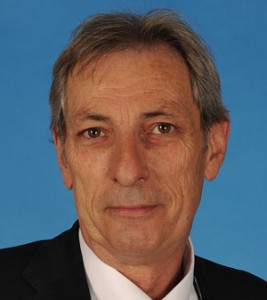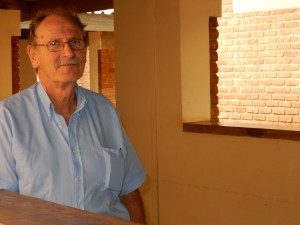PSOGI-Life Time Achievement Awards
During the PSOGI 2016 meeting in Washington, two PSOGI-members will be honored. Dr Zoetmulder and dr Gilly will receive the “PSOGI Life-time Achievement Awards” for their pioneering work in the treatment of peritoneal metastases.
DR. FRANÇOIS NOËL GILLY, MD, PhD
François Noël Gilly was born May 1rst 1955 and is a French University Professor in General Surgery in Lyon 1 University and Lyon Sud Hospital, internationally recognized for his contribution in oncologic surgery and especially in peritoneal carcinomatosis.
He was Dean of Lyon Sud Charles Mérieux Faculty for 13 years, from 1999 to 2012 and then President of Claude Bernard Lyon 1 University from 2012 to 2016.
Officer of the Order of Academic Palms, he received the distinction of Knight of the Legion of Honour in January 2011.
In the field of peritoneal carcinomatosis, he was an international pioneer by performing the first HIPEC in Europe in 1989 in a young women with gastric cancer after an experimental study in dogs and a work visit in Japan in the Fujimoto’s department. Then he developed techniques of cytoreductive surgery and HIPEC and promoted this therapeutic management in France and all over the world, despite initial major skepticism of the oncologic community. With the help of his anesthesiologist, Annie Claude Sayag Beaujard, he built an HIPEC machine with the support of Lyon 1 University, developed the closed technique, and taught the combined procedure to French and foreign surgeons welcomed into his department, but also by performing procedures in many current specialized centers in the management of peritoneal surface malignancies. He organized the 6th International Workshop on Peritoneal Surface Malignancy in Lyon in 2008, where was reported for the first time the results of the French registry including more than 1200 patients treated with cytoreductive surgery and HIPEC with the collaborative effort of 25 institutions.
He is director of University Research Team EMR 3738 dedicated to targeted therapy in oncology since 13 years, including experimental animal research laboratory. He created a French Network of specialized centers in rare peritoneal disease, RENAPE, with the support of the French National Cancer Institute (INCA), and is now one of the leaders of the European Network on rare disease, EURACAN. This unique RENAPE Network was and is the tool that allows the conduction of most of the major French clinical trials that evaluated cytoreductive and HIPEC in the management of peritoneal surface malignancy disease from various origins.
He was the first surgeon to report experience of HIPEC for the management of peritoneal carcinomatosis in high level oncologic journal like the Journal of Clinical Oncology, in 2003. His team published today more than 180 articles indexed in Pubmed on this field. He also conducted the first experience and the first trial of gene therapy in solid tumors in 1997.
François Gilly is not only a surgeon or a president but also a writer of books on ethics and sea, a magician, a theater actor and a sailor.
Dr. FRANS ZOETMULDER, MD, PhD
Frans Zoetmulder was born in 1947 in Eindhoven, the Netherlands. He graduated from the Medical School of the University of Leiden. After completing his surgical training at the Bronovo Hospital in The Hague, he became a Fellow in Surgical Oncology at the Antoni van Leeuwenhoek Hospital – the Netherlands Cancer Institute in Amsterdam. During his fellowship he demonstrated his interest in peritoneal malignancies by completing his PhD research on the treatment of colon cancer with peritoneal dissemination in a mice model.
Between 1984 and 2007 he was a staff member in the Department of Surgical Oncology at the Antoni van Leeuwenhoek Hospital – the Netherlands Cancer Institute in Amsterdam. Following a sabbatical which was devoted to the treatment of peritoneal malignancies and staying for one year with Paul Sugarbaker in the Washington Cancer Institute, he introduced cytoreductive surgery and intraoperative hyperthermic intraperitoneal chemotherapy for peritoneal malignancy in the Netherlands. As being a pioneer in this field in the Netherlands and combining great enthusiasm with outstanding surgical skills, he treated hundreds of patients with peritoneal carcinomatosis of colorectal origin or pseudomyxoma peritonei from the entire country with this method in the Netherlands Cancer Institute. In 1998, he convinced the national Dutch Medicine Development Fund of the necessity of undertaking a randomized trial on the benefit of cytoreductive surgery and intraoperative hyperthermic intraperitoneal chemotherapy. With that grant he carried out this most important and still unique study, which demonstrated a clear survival benefit for patients with colorectal peritoneal carcinomatosis. The fact that cytoreductive surgery and intraoperative hyperthermic intraperitoneal chemotherapy has been implemented in national guidelines for the treatment of peritoneal carcinomatosis of colorectal origin, is largely attributed to this initiative of Frans Zoetmulder.
The acronym HIPEC was used for Hyperthermic IntraPEritoneal Chemotherapy in this study for the first time. At the congress dinner of the 4th International Workshop on Peritoneal Surface Malignancy in Madrid in 2004, after voting it was decided that HIPEC should be chosen as the worldwide uniform acronym for this treatment modality, as proposed by Dr. Frans Zoetmulder. His encouraging results of cytoreductive surgery and HIPEC for patients with colorectal peritoneal carcinomatosis and pseudomyxoma peritonei in the Netherlands Cancer Institute resulted in full reimbursed of the costs of this treatment modality by the Dutch Health Assurances and subsequent development of other similar centers in the Netherlands, for a total of nine at present.
He also introduced simpler intra-operative assessment tools of peritoneal involvement of colorectal cancer and validated their predictive and prognostic value. His inventive way of thinking and catching enthusiasm has led to a large amount of research, several PhD theses and numerous publications in this specific surgical field.


